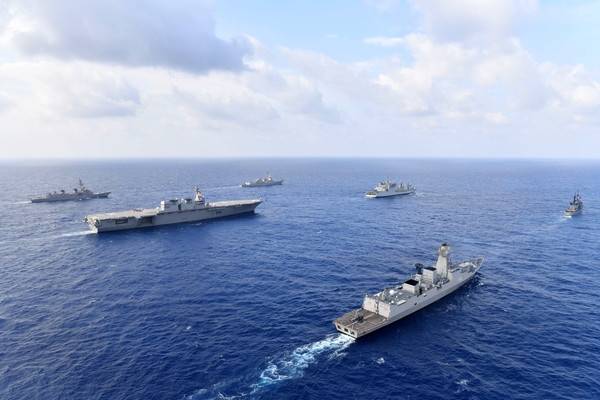Philippines has Accused China’s maritime militia of destruction of coral reefs near Palawan, a southwestern island chain facing the South China Sea….reports Asian Lite News
The Philippines has accused China’s shadowy maritime militia of causing extensive coral reef destruction in the South China Sea, which has ignited a public dispute between the two nations over the contentious maritime region, CNN reported.
Videos released by the Philippine Coast Guard have revealed substantial damage to coral reefs along the Rozul (Iroquois) Reef and Sabina (Escoda) Shoal in the South China Sea. These underwater features fall within the Philippines’ internationally recognized exclusive economic zone (EEZ) and are located near Palawan, a southwestern island chain facing the South China Sea. However, China asserts sovereignty over a significant portion of the South China Sea, challenging competing claims by neighbouring countries and international rulings.
Commodore Jay Tarriela, the spokesperson for the Philippine Coast Guard, disclosed that underwater surveys conducted by divers indicated “visible discolouration” and alterations in the seabed’s natural topography, suggesting intentional activities to modify the terrain. Tarriela asserted that the actions of China’s Maritime Militia, particularly their indiscriminate illegal and destructive fishing activities in the area, may have directly led to the degradation and destruction of marine environments within the Philippines’ jurisdiction, as reported by CNN.
Between August 9 and September 11, the Philippine coast guard reported monitoring 33 Chinese vessels near Rozul Reef and approximately 15 Chinese ships in the vicinity of Escoda Shoal. The presence of crushed corals strongly suggests potential dumping, possibly involving dead corals that were previously processed and then returned to the seabed.
The Philippine military had previously accused China’s maritime militia of causing extensive destruction in the area. However, China initially remained silent on the allegations until its foreign ministry spokesperson, Mao Ning, refuted the claims as “false and groundless.” Mao advised Philippine authorities not to utilize fabricated information for political purposes, according to CNN.
China has asserted “indisputable sovereignty” over a vast portion of the South China Sea, including the Spratly chain, which consists of 100 small islands and reefs. These territorial claims are contested, in full or part, by the Philippines, Malaysia, Brunei, and Taiwan. China’s actions in the South China Sea, including the construction of military installations on reefs and atolls, have challenged not only the Philippines’ sovereignty but also the marine biodiversity of the highly disputed region.
The recent footage of damaged and bleached coral reefs is a stark contrast to the vibrant marine ecosystem observed just two years ago. While the University of the Philippines Marine Science Institute had previously documented the health of the Rozul (Iroquois) Reef in 2021, the current status of the reef remains uncertain. The institute emphasized the importance of continuous monitoring and marine scientific research activities to assess the impacts of recent activities in the area.
The degradation of marine resources in the South China Sea highlights the threats posed by coral harvesting and raises suspicions of China’s plans to militarize atolls through land reclamation. Western marine security experts and officials from various countries have accused China of using civilian fishing vessels as a maritime militia, a force that advances China’s territorial claims in the region while maintaining deniability, CNN reported.
The destruction of marine resources has prompted concern among foreign ambassadors in Manila. United States Ambassador MaryKay Carlson and Japanese Ambassador Kazuhiko Koshikawa expressed alarm and emphasized the need to protect vital ecosystems.
The Philippine Department of Foreign Affairs has consistently raised concerns over ecologically harmful activities conducted by foreign vessels in its maritime zones. The Philippines’ efforts to garner international support to affirm its territorial sovereignty have yielded results, especially as transparency about activities in the South China Sea becomes increasingly vital.
Under the leadership of President Ferdinand Marcos Jr., the National Security Team of the Philippines has enhanced transparency regarding developments in the West Philippine Sea and the South China Sea. This approach has gained domestic and international support for the Philippines’ position in the ongoing maritime disputes, CNN reported. (ANI)

Leave a Reply